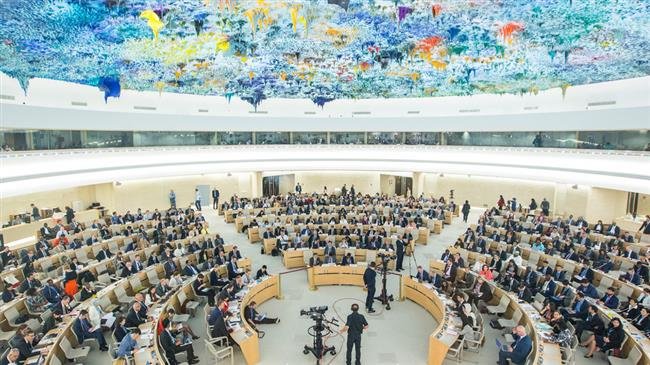Alwaght- The UN human rights session is expected to pose grave questions to Saudi Arabia over a deadly Saudi-led war on Yemen as well as the recent killing of dissident Journalist Khashoggi by the regime’s agents in Turkey.
The war on Yemen and the killing of Jamal Khashoggi inside the kingdom’s consulate in Istanbul on October 2 are, however, only two of the matters likely to be raised at the Universal Periodic Review, a public debate organized by the UN Human Rights Council in Geneva for Monday.
Saudi Arabia has also already been reprimanded for its restrictions on women, and the high number of executions in the country, which are in fact beheadings carried out by sword and often at public squares.
While the Council has 47 members, all the 193 member states of UN can take part in the Universal Periodic Review — a periodic review of the rights situation that is held on a rotational basis for all UN member states every four and a half years.
Amnesty has said participating countries must not withhold tough questions.
“UN member states must end their deafening silence on Saudi Arabia and do their duty of scrutinizing the cruelty in the kingdom in order to prevent further outrageous human rights violations in the country and in Yemen,” said Samah Hadid, Amnesty International’s Middle East director of campaigns. “The Saudi government’s long-standing repression of critics, exemplified by the extrajudicial execution of journalist Jamal Khashoggi last month, has until recently been willfully ignored by UN member states.”
Some countries have already submitted direct questions. Britain, Austria, and Switzerland plan to ask questions about the Khashoggi case. Sweden aims to ask about "freedom of expression and the safety of journalists" in Saudi Arabia.
The UN itself in August published a report detailing a range of concerns about Saudi Arabia's rights record.
Saudi Arabia has been leading a coalition of mainly its vassal states in a war on and blockade of Yemen since 2015. In August 2016, a senior UN official said the war had killed 10,000 people. That number has not since been revised by the UN, but rights groups say it is likely five times that high now.
The war has also put Yemen on the brink of famine and caused epidemics of cholera, diphtheria, and other contagious diseases.
"Yemen today stands on a precipice," UN Secretary General António Guterres said alarmingly on Friday, November 2, also calling for an end to the war.
According to Turkish officials, Khashoggi, a Saudi insider-turned-critic, was brutally murdered by a hit squad of 15 people, including at least one frequent companion of Crown Prince Mohammed bin Salman, and several members of his security detail, on October 2.
The Saudi consul general fled Turkey later that same day.
Turkish President Recep Tayyip Erdogan wrote in an op-ed piece for The Washington Post on November 2 that Ankara "know[s] the order to kill Khashoggi came from the highest levels of the Saudi government." He has several times insisted that Riyadh reveal who exactly ordered that killing.
Saudi Arabia initially denied the murder, but then changed its narrative amid intense international attention. Riyadh is yet to produce Khashoggi's body.



























